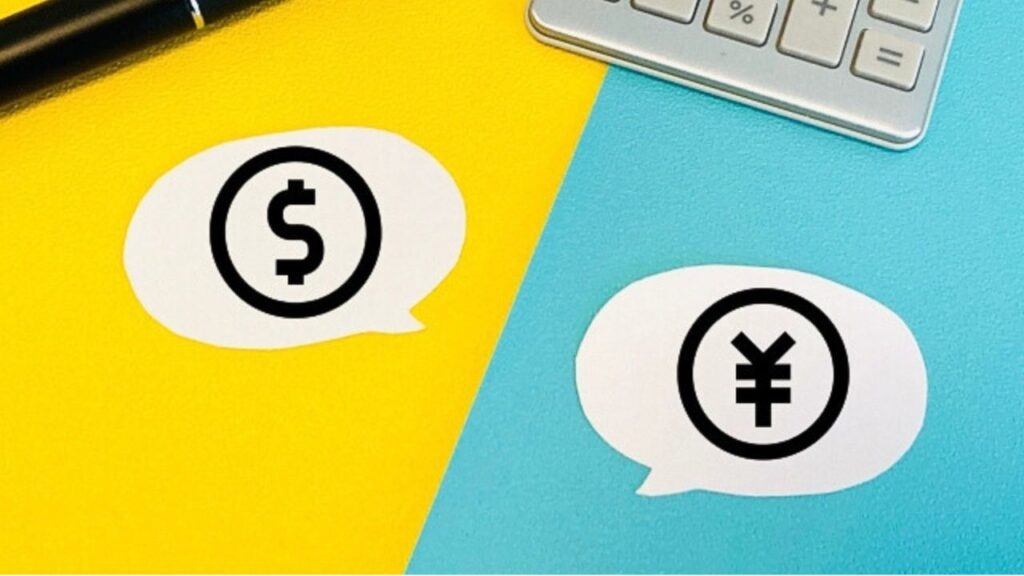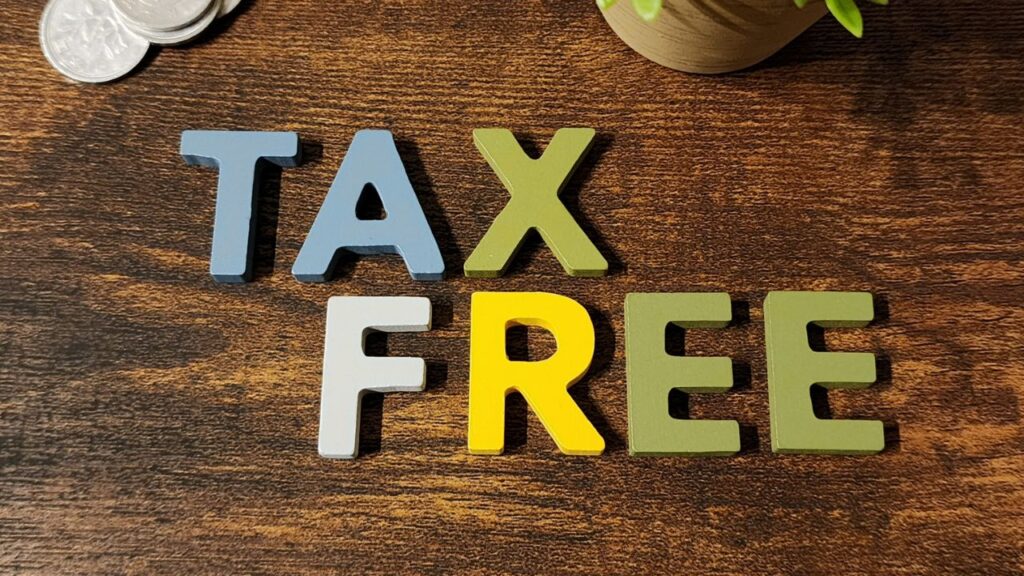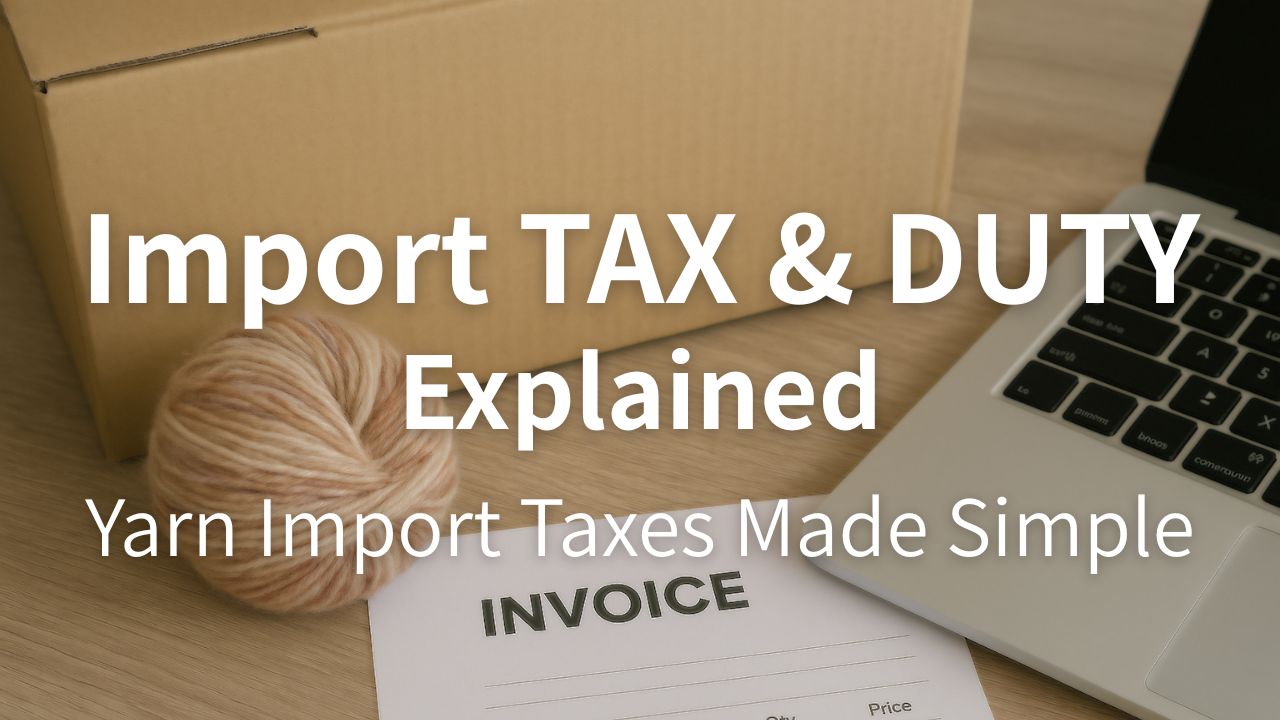This article is the third part of my series documenting my experience importing Malabrigo yarn from Wool and Company in the United States.
In this chapter, I’ll focus on the actual costs involved.
When overseas knitters—or yarn sellers shipping to Japan—look into sending yarn to a Japanese address, terms like “customs duty” and “import consumption tax” often come up. These taxes are determined by Japanese Customs and are paid by the recipient in Japan (the importer), not the overseas shop.
To make this easy for both buyers and sellers to understand, I’ll break down how these taxes work in Japan and share what happened in my own shipment.
Customs Duty vs. Import Consumption Tax in Japan
When you buy yarn (or any goods) from overseas and have it shipped to Japan, your package will be inspected by Japanese Customs.
At this point, two types of taxes may apply:
1. Customs Duty
Customs Duty is a tax imposed by Japan on goods entering the country.
Its purpose is to protect domestic industries, and the tax rate is determined solely by the importing country—in this case, Japan.
According to Japan’s official tariff schedule, yarn (including knitting yarn) is classified under HS codes that carry a 0% duty rate.
In other words:
- Yarn imports into Japan are duty-free.
- No customs duty is charged on personal yarn imports.
(As always, exceptions can occur depending on fiber type or product classification, but yarn is generally duty-free.)
2. Import Consumption Tax (National + Local)
This tax works very similarly to Japan’s domestic consumption tax you pay when shopping inside Japan.
It applies when goods purchased overseas are intended for use within Japan.
The tax consists of two parts:
- Import Consumption Tax (National)
- Local Consumption Tax
Together, they effectively mirror Japan’s standard 10% consumption tax system.
This tax is separate from customs duty. Even if the duty rate is 0%, the import consumption tax may still apply—depending on the shipment’s dutiable value.
Summary Table
| Import Consumption Tax | Customs Duty | |
|---|---|---|
| Purpose |
Ensuring fairness of domestic consumption tax Comment: If overseas products weren’t taxed, people wouldn’t want to pay consumption tax on Japanese products. |
Protection of domestic industries |
| Subject |
All imported goods (Excluding non-taxable items) |
Some imported goods Yarn is non-taxable |
| Tax Rate |
10% (Reduced tax rate applies to 8%) |
Varies by product (0% to several tens of percent) |
| Calculation Basis | Taxable value (CIF price※ + Customs Duty + Other domestic taxes) | Taxable value (CIF price※) |
| Payment Timing |
For personal import of yarn, payment is made to the delivery company upon receipt of the package. | |
Impact of the “Trump Tariffs” on Personal Yarn Imports into Japan

During a recent knitting meetup, someone said:
“Buying yarn from the U.S. feels risky right now…
With the Trump tariffs, who knows what might happen?”
I had heard the phrase “Trump tariffs” before, but I didn’t actually understand what they were or whether they affected yarn shipments from the U.S. to Japan.
So I decided to look into it seriously and figure out if these new tariffs impact personal yarn imports into Japan.
What Are the Trump Tariffs?
In April 2025, shortly after the start of Donald Trump’s second administration, a new tariff policy—popularly called the Trump Tariffs—was announced.
It consists of two major components:
1. A flat 10% tariff on all imports into the United States
This is the first stage.
It applies to goods the U.S. imports from other countries.
2. Higher tariffs on countries with large trade deficits with the U.S.
Referred to as “reciprocal tariffs,” these increase duties on countries or regions that export significantly more to the U.S. than they import.
So… does this affect yarn shipped from the U.S. to Japan?
⇒No, not directly.
These tariffs apply to goods entering the United States, not to products being exported from the U.S. to Japan.
When we in Japan buy yarn from U.S. shops, the taxes that matter are determined entirely by Japanese Customs:
- Japan’s customs duty rate (0% for yarn)
- Japan’s import consumption tax
Therefore, the Trump tariffs do not directly influence personal yarn imports into Japan.
However, there is one possible indirect effect:
If U.S. manufacturers pay higher tariffs on imported raw materials, production costs may rise.
If the cost of imported fibers or equipment increases in the U.S., those additional expenses could be reflected in the final retail price of yarn.
But again:
- Yarn imported into Japan itself is duty-free.
- Trump tariffs do not create new taxes for Japanese buyers.
Ultimately, the biggest factor affecting the cost of U.S. yarn for Japanese knitters is simply:
⇒the exchange rate.
Why No Import Consumption Tax Was Charged

Now that we understand the difference between customs duty and import consumption tax—and that the Trump tariffs do not affect yarn shipped from the U.S. to Japan—let’s look at why I didn’t have to pay any import consumption tax this time, even though I expected to.
Purchase Details & Yen Conversion
Here is the breakdown of my order from the U.S.:
| Item | Amount |
|---|---|
| Yarn Cost | 91.20 USD |
| Shipping | 32.24 USD |
| Total | 123.44 USD |
Exchange rate at payment: ≈149 JPY / USD
Final credit card charge: 19,186 JPY
Import consumption tax in Japan is normally applied to:
- the cost of the goods plus
- a customs brokerage fee (the fee delivery companies charge for advancing tax on your behalf)
So why?
Why No Tax Was Charged — My Analysis
The most likely reason is that the shipment fell under Japan’s de minimis threshold for personal imports.
Japan uses a special simplified method for personal importsFor personal-use shipments, Japanese Customs calculates the dutiable value (課税価格) as:
60% of the item value
(Shipping is excluded for this specific calculation.)
Then, if this calculated value is:
Under 10,000 JPY → No import consumption tax is charged.
Let’s apply this to my order:
- Item cost: 91.20 USD
- Exchange rate: 149 JPY
- Dutiable value:
91.20 × 149 × 0.6 = approx. 8,160 JPY
Since 8,160 JPY is below the 10,000 JPY threshold:
➡️ The shipment qualifies for tax exemption.
➡️ No import consumption tax was charged.
Final outcome:
- Customs Duty: 0% (yarn is duty-free)
- Import Consumption Tax: exempt
- Total paid: only the yarn cost + shipping = 19,186 JPY
Summary

- Yarn is classified as duty-free in Japan.
- Import consumption tax (Japan’s equivalent of sales tax) is waived when the dutiable value is under 10,000 JPY.
- The Trump tariffs do not apply to goods shipped from the U.S. to Japan.
- Depending on the exchange rate and declared value, some personal yarn imports may arrive tax-free.
That said, customs decisions can vary, and fluctuations in exchange rates may push similar orders above the threshold.
Think of this case as “lucky—this shipment fell below the line.”
Also note: while yarn usually has zero duty, other craft supplies (buttons, hardware, fabrics) can be subject to duty depending on material and classification.
Threads Conversation: When Someone Was Charged ‘Customs Duty’
Original Post : I was charged customs duty on my latest import…
Reply : Customs duty? Not import consumption tax?
Original Poster : They said it was duty.
The delivery carrier explained, “If you buy too much at once, it can be treated as commercial use, and duty may be applied.”
Situations like this do happen occasionally.
If a shipment looks commercial (large quantity, multiple identical items, resale pattern), Customs may treat it differently.
In cases of disagreement, Japanese law allows for a formal objection (appeal) regarding taxation.
I honestly hope the poster followed up, but Threads tends to get heated quickly in my feed, so I couldn’t track what happened next!
Related Articles
This article is part of a series documenting my experience importing Malabrigo yarn from the U.S.
If you’re new to buying yarn from overseas, you might find the earlier posts helpful:




